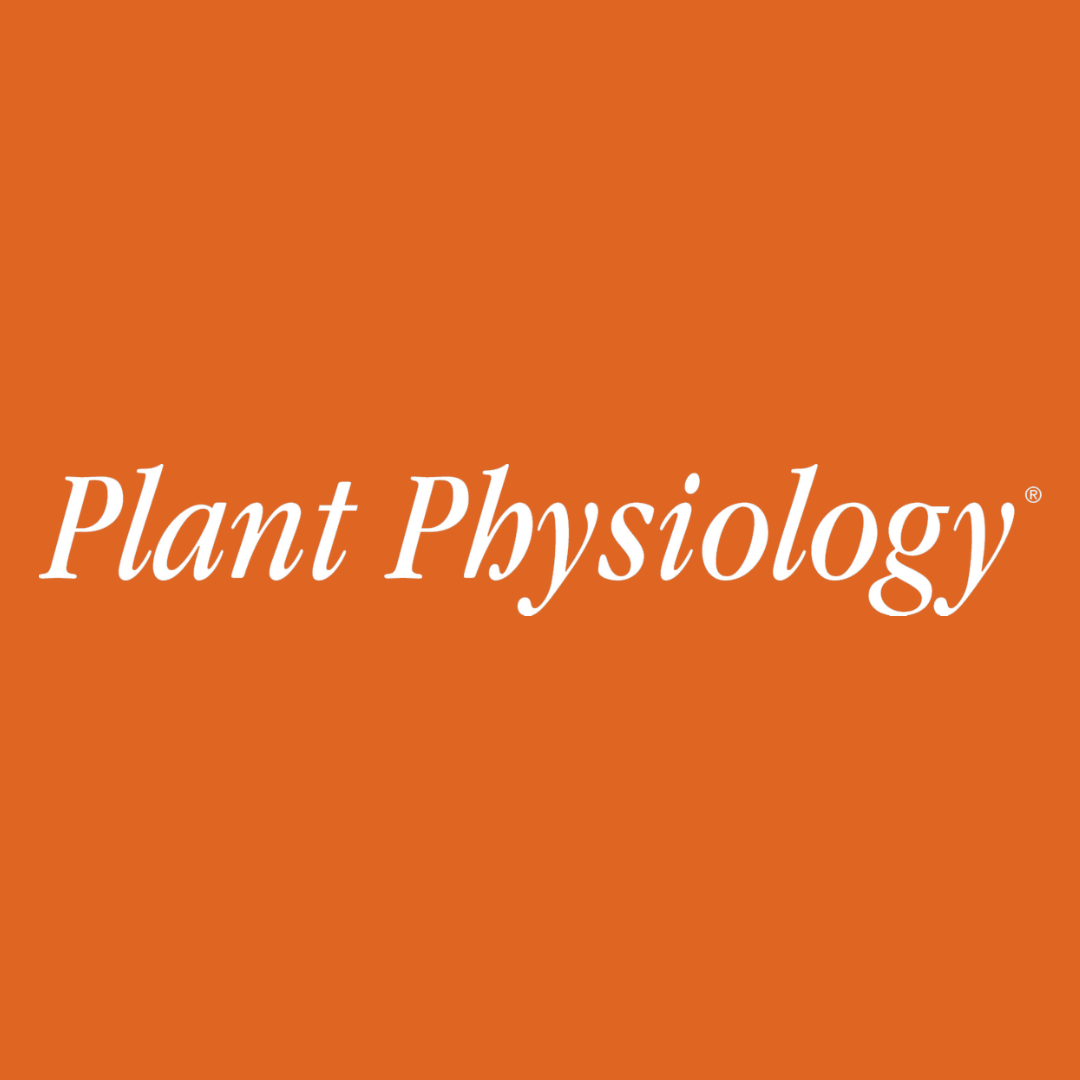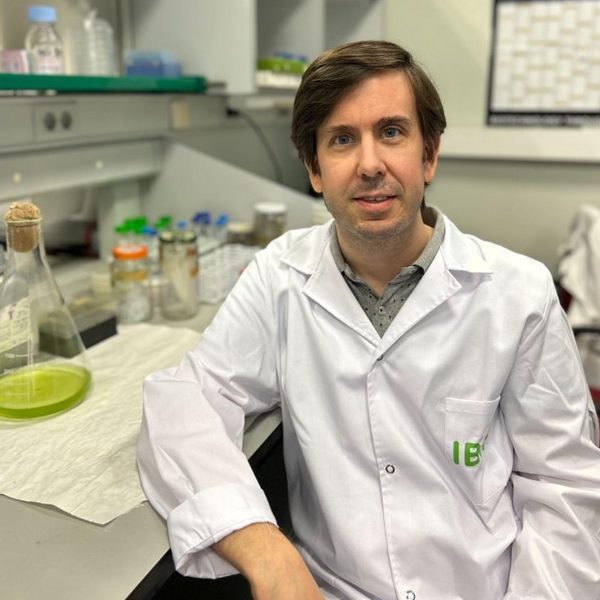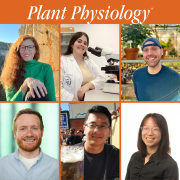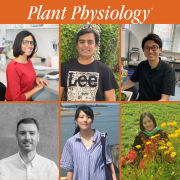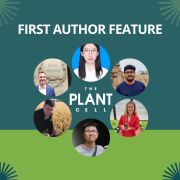Plant Physiology Spotlights September First Authors
In September, we published many innovative manuscripts in Plant Physiology. Behind those manuscripts are researchers, professors, professionals and students dedicated to advancing the field of plant science. You’ve seen our First Authors on Twitter and Facebook— now, read more about why they chose to pursue plant sciences and click on the links below the pictures to read their articles.
 Parthiban Thathapalli Prakash
Parthiban Thathapalli Prakash
Parthiban Thathapalli Prakash (He/Him) is the First Author of Oryza glumaepatula: A wild relative to improve drought tolerance in cultivated rice published 04 September 2023. He is currently a Scientist at the International Rice Research Institute. Prakash earned a Ph.D in Crop Sciences at University of Illinois Urbana Champaign in 2019; a MS in Plant Breeding and Genetics at Cornell University and a MSc in Biotechnology at Tamil Nadu Agricultural University in 2014; and a BTech in Biotechnology at Tamil Nadu Agricultural University in 2010.Research interests include plant breeding, Abiotic stress, Quantitative genetics, Statistics. Personal interests include tennis and wildlife watching. Prakash’s interest in plants is because they are the provider of food and fuel to the world.
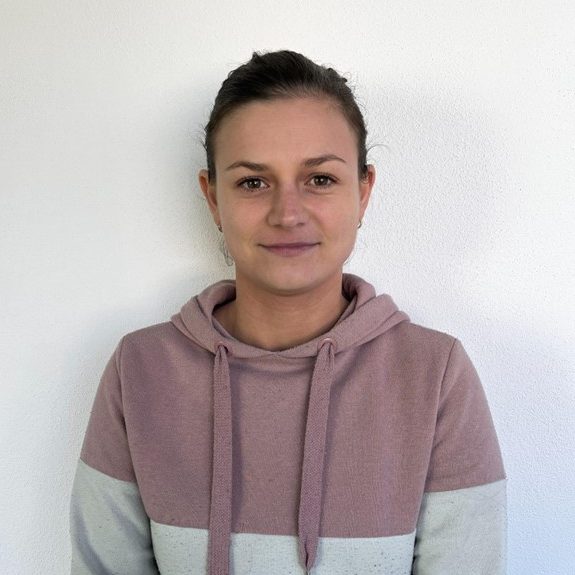 Lenka Kuběnová
Lenka Kuběnová
Lenka Kuběnová (she/her) is a First Author of Spatiotemporal distribution of reactive oxygen species production, delivery, and use in Arabidopsis root hairs published 04 September 2023. She holds a Ph.D. Biochemistry from Palacky University in Olomouc (2022). She also earned a Mgr. in Molecular and cellular biology from Palacky University in Olomouc in 2016. And, in 2014, Kuběnová earned a Bc. in Molecular and cellular biology fromPalacky University in Olomouc. Research interests include Plants, root hairs, abiotic stress, reactive oxygen species, and cytoskeleton. Personal interests include family, running, and hiking.
“If we do not have plants, we can not breathe, eat, or live. It is so magical to understand how they grow and develop. And they can grow almost anywhere too, so it is amazing how adaptable plants are,” says Kuběnová on why she loves plant science.
Jan Haberland
Jan Haberland (he/his) is a First Author of Spatiotemporal distribution of reactive oxygen species production, delivery, and use in Arabidopsis root hairs published 04 September 2023. In 2023, he earned a MSc in Biotechnology and Gene Engineering at Palacký University Olomouc, and in 2021 he earned a BSc in Biotechnology and Gene Engineering at Palacký University Olomouc. Research interests include Root hairs, Reactive Oxygen Species, and Actin Cytoskeleton. Personal interests include Hiking, Mountain biking, Fishing and Aquascaping.
Haberland had the opportunity to work on and be an equally contributing first author of the publication “Spatiotemporal distribution of ROS production, delivery and utilization in Arabidopsis root hairs” as a master student. Under supervision of Dr. Lenka Kuběnová, the second equally contributing first co-author of this publication, and mentored by Prof. Miroslav Ovečka, he was allowed to use all facilities in the laboratory of Prof. Jozef Šamaj at the Department of Biotechnology, Faculty of Science, Palacký University in Olomouc during his bachelor’s and master’s studies. This is his first scientific publication. Considering the very high reputation of the Plant Physiology journal, it is the best start to his scientific career.
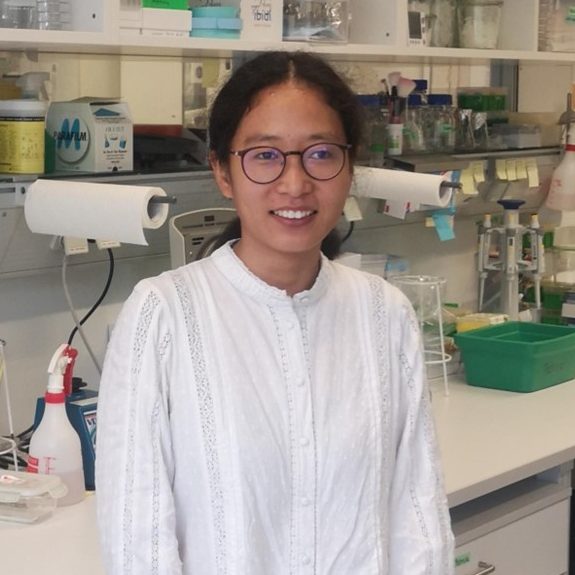 Xia Chen
Xia Chen
Xia Chen (sher/her) is the First Author of Arabidopsis MCTP family member QUIRKY regulates the formation of the STRUBBELIG receptor kinase complex published 05 September 2023. She is currently a Postdoc in the group of Prof. Dr. Thomas Dresselhaus, Cell Biology and Plant Biochemistry, at the University of Regensburg, Regensburg, Germany. Previously, she was a Ph.D in the group of Prof. Dr. Kay Schneitz at the Technical University of Munich in Germany. In 2017, Chen earned her MSc at the Institute of Botany, Chinese Academy of Sciences, Beijing, China. In 2013, she received a BSc from Shandong Agricultural University, Shandong, China.Research interests include plant signal transduction, plant reproductive development, and abiotic stress. Personal interests include Reading, Fiction and Traveling.
In the process of being in contact with nature, Chen gradually became curious about the mechanism of plant growth regulation and marveled at the powerful network mechanism of plant signal communication and development, which inspired her to delve into plant science and reveal the tip of the iceberg.
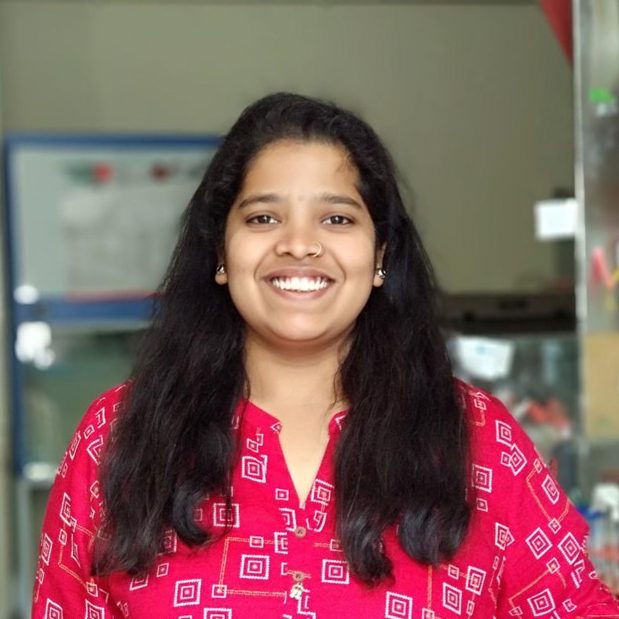 Nilam Namdeo Malankar
Nilam Namdeo Malankar
Nilam Namdeo Malankar (she/her) is the First Author of A novel phasiRNA siRD29(-) regulates GIBBERELLIN 3-OXIDASE 3 during stolon-to-tuber transitions in potato published 11 September 2023. Malankar is currently an Integrated PhD student at Indian Institute of Science Education and Research (IISER) Pune, India. In 2016, she earned a MSc in Biological Sciences at IISER Pune, and in 2014, she earned a BSc in Biotechnology at Mumbai University, India. Research interests include Small RNA regulatory networks in plant reproductive processes and plant-environment interactions. Personal interests include Listening to music, dancing and traveling.
She is fascinated by how plants use small RNAs for intricate growth orchestration. The wonders of plant science never cease to amaze us!
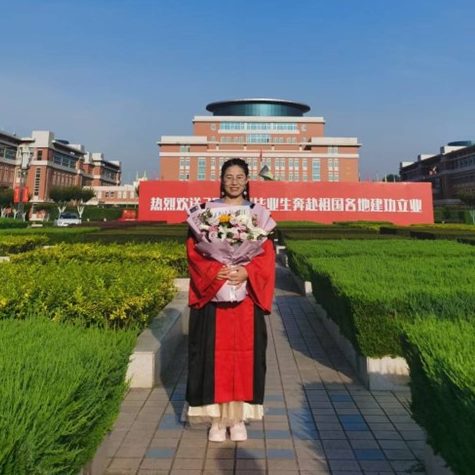 Peijing Zheng
Peijing Zheng
Peijing Zheng is the First Author of Stripe rust effector Pst21674 compromises wheat resistance by targeting transcription factor TaASR3 published 14 September 2023. Zheng is currently working on a Postdoctoral application. In 2023, Zheng earned a ph.D in Biochemistry and Molecular Biology at Northwest A&F University; in 2016, a MSc in Biochemistry and Molecular Biology from Northwest A&F University and in 2013, a BSc in Bioengineering from Shanxi Normal University. Research interests include Biotic stress. Personal interests include reading. Peijing Zheng’s supervisor, Professor Jie Liu , inspired and mentored his research.
Jiameng Zhu
Jiameng Zhu (she) is the First Author of PER-seq: a simple method to screen transcriptional regulations in plants published 14 September 2023. She is currently a Ph.D. student at Nanjing Normal University. In 2023 she earned a Master degree from Anhui Agricultural University. And in 2020, Zhu earned a Bachelor degree from Jiangxi Agricultural University. Research interests include plant growth and development. Personal interests include reading novels and traveling.
Her research was conducted under the guidance of researcher Xiaojin Zhou , who gave her a lot of help and encouragement during this period.
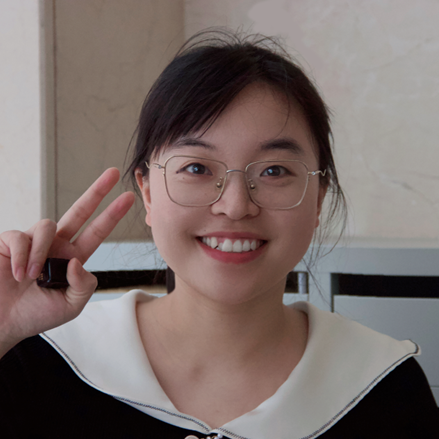 Yuhan Yang
Yuhan Yang
Yuhan Yang is the First Author of Soil-root interface hydraulic conductance determines different response of photosynthesis to drought in rice and wheat published 14 September 2023. She is currently a Ph.D candidate at Huazhong Agricultural University. In 2017, Yang earned a MSc from Huazhong Agricultural University. In 2012, she earned a BSc from Henan Agricultural University. Research interests include Plant Physiology and Ecology, Photosynthesis and abiotic stress. Personal interests include running and her cat Coco.
She has been studying in Prof. Yong Li’s laboratory at Huazhong Agricultural University since 2017. Yang’s research is focused on crop physiology, specifically on crop photosynthesis and hydraulic conductivity. Her supervisor has led her into the fascinating realm of plant science, and she has always received his inspiring support and encouragement for my research interests and goals.
Atara Gal
Atara Gal is the First Author of Plasma membrane aquaporins regulate root hydraulic conductivity in the model plant Setaria viridis published 22 August 2023. In 2019, Gal earned a MSc in Plant Science at Tel Aviv University. Research interests include plant physiology and personal interests include running. Gal is inspired by their thesis mentor, Dr. Nir Sade. They have managed to learn a countless amount from Nir’s plant physiology and molecular work.
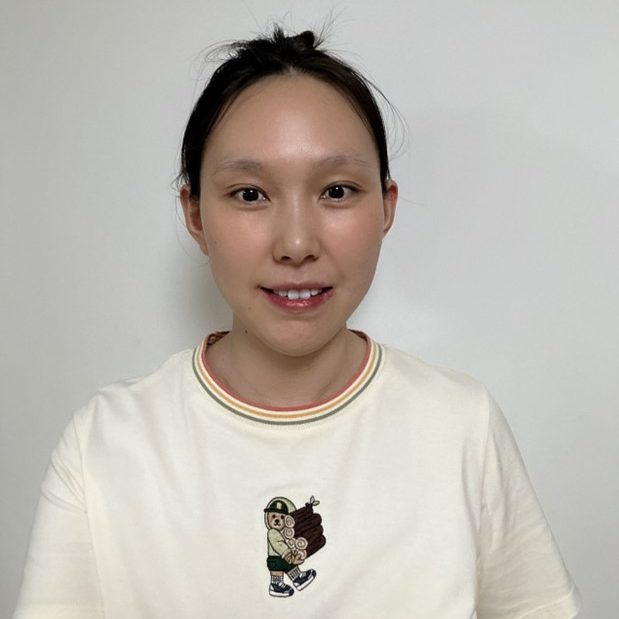 Kun Jia
Kun Jia
Kun Jia (she/her) is the First Author of Deciphering structure, function and mechanism of a novel lysine acetyltransferase cGNAT2 in cyanobacteria published 28 September 2023. She is currently at the Institute of Hydrobiology Chinese Academy of Sciences. In 2023, Gal earned a Ph.D Genetics at University of Chinese Academy of Sciences; in 2019, she earned a MSc at Harbin normal University; in 2015, a BSc Biology at Harbin normal University. Research interests include Proteomics of aquatic organisms. Personal interests include painting.
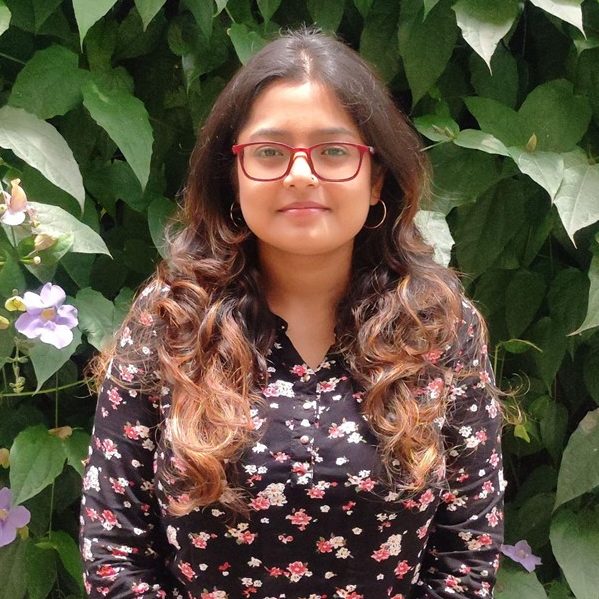 Shirsa Palit
Shirsa Palit
Shirsa Palit (she/her) is the First Author of Peptides from conserved tandem direct repeats of SHORT-LEAF regulate gametophore development in moss P. patens published 28 September 2023. She is currently a PhD student (Thesis Defended), Indian Institute of Science Education and Research (IISER), Pune. She is pursuing a Ph.D., from the Indian Institute of Science Education and Research (IISER) Pune, India. Palit earned a an MSc in Biotechnology, from the University of Allahabad and a BSc in Biotechnology, Biochemistry and Genetics, from Bangalore University. Research interests include plant development and stress response, plant primary and secondary metabolism, abiotic stress,and plant response to environmental cues. Personal interests include writing poetry, walks in nature, composing music, and baking. Growing up amid nature, Palit was captivated by plants’ adaptability and resilience in face of adversity, sparking her passion for plant science.
Manuel Jesús Mallén Ponce
Manuel Jesús Mallén Ponce is the First Author of Redox-mediated activation of ATG3 promotes ATG8 lipidation and autophagy progression in Chlamydomonas reinhardtii published 29 September 2023. Ponce is currently a Postdoctoral researcher at Plant Biochemistry and Photosynthesis Institute (CSIC-Universidad de Sevilla). He holds a PhD degree in Biochemistry and Molecular Biology (2020) at Universidad de Sevilla, Spain. A MSc in Molecular Genetics and Biotechnology (2014), and a BSc in Biochemistry (2013).
Ponce has always been very interested in understanding metabolism and how photosynthetic organisms respond and adapt to changes in their local environment. For this reason, he started a PhD focused on the study of redox regulation via thioredoxin in cyanobacteria at the Universidad de Sevilla. After finishing a PhD, he did my first postdoctoral stage in the “TOR signaling in Chlamydomonas” group led by Dr. José Luis Crespo, studying nutrient sensing and TOR signaling in the model green alga Chlamydomonas. TOR is a cell growth master regulator that controls key cellular processes such as protein synthesis.
Moreover, he also got the opportunity to investigate how stress and redox signals are integrated to regulate autophagy, a TOR-controlled degradative process required for cellular adaptation to stress, under the supervision of Dr. María Esther Pérez Pérez at the IBVF. They focused on the redox control of autophagy and the molecular mechanisms that regulate some central autophagy related-proteins such as ATG3. Last year, Ponce earned a Margarita Salas postdoctoral fellowship in the laboratory of Prof. Stéphane Lemaire at the Institute of Biology Paris-Seine (CNRS-Sorbonne Université).
Personal interests include traveling around the world with his wife María José and son Pablo, hiking, Formula 1, collecting model cars and playing football whenever he can.In 2023, Ponce returned to the lab of Dr. José Luis Crespo with a Juan de la Cierva postdoctoral fellowship to continue the study of the TOR signaling pathway and autophagy.
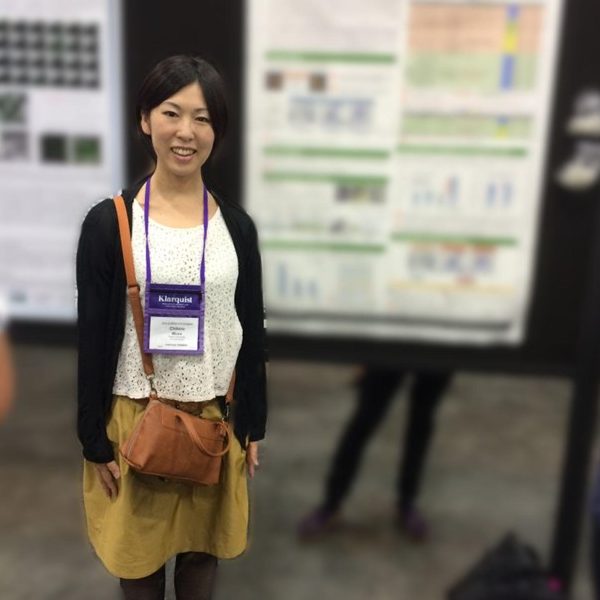 Chihiro Miura
Chihiro Miura
Chihiro Miura (she/her) is the First Author of Autoactivation of mycorrhizal symbiosis signaling through gibberellin deactivation in orchid seed germination published 30 September 2023. Miura is a Postdoc at Tottori University. In 2015, she earned a Ph.D in Agriculture at Tokyo University. In 2012,she earned a MSc in Agricultural and Environmental Biology at Tokyo University and in 2010, a BSc in Agro-Biological Resource Sciences at University of Tsukuba. Research interests include Plant-microbe interactions. Personal interests include running, listening to classical music, and watching anime. Miura is interested in plant science because plants are completely different from humans.




